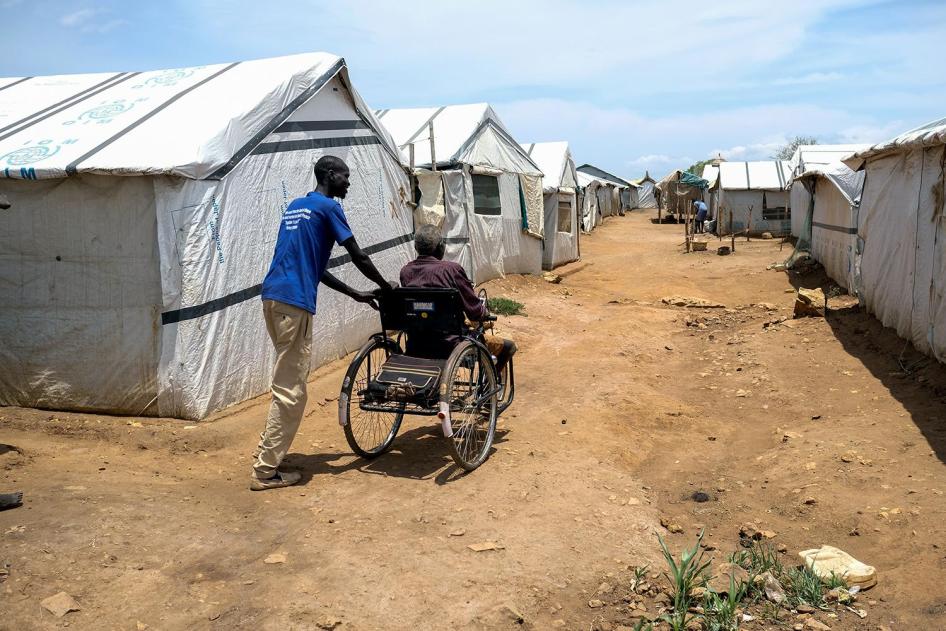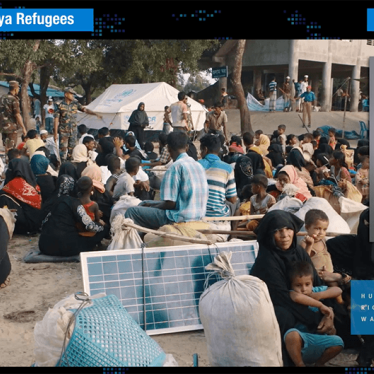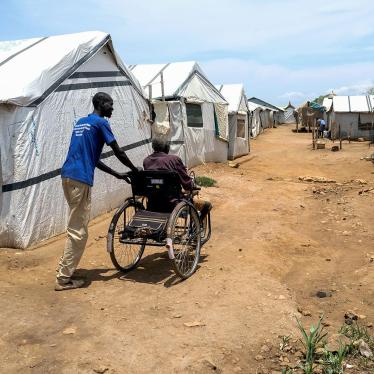(New York) – On December 3, 2018, United Nations Security Council members will shine a spotlight on the disproportionate impact of armed conflict on people with disabilities, Human Rights Watch said today. People with disabilities have been invisible on the peace and security agendas of many countries around the world but are among the people most at risk during conflicts and humanitarian crises.
More than one billion people worldwide, or about 15 percent of the global population, have a disability. People with disabilities are recognized as among the most marginalized and at-risk population in any crisis-affected community. An estimated 9.7 million people with disabilities are forcibly displaced as a result of conflict and persecution and are victims of human rights violations and conflict-related violence.
The December 3 informal “Arria” meeting of members of the Security Council will be the first time the Security Council had devoted a separate discussion to the impact of conflict on people with disabilities, though it has recognized the particular risks experienced by people with disabilities in some resolutions about individual countries.
“The Security Council’s mandate on protection of civilians includes all civilians – including people with disabilities,” said Shantha Rau Barriga, disability rights director at Human Rights Watch. “It’s crucial for the Security Council to gather the information needed to make sure that ‘No one left behind’ is not mere rhetoric.”
Research by Human Rights Watch over the last five years in the Central African Republic, Cameroon, Iraq, Myanmar, South Sudan, and Yemen shows that people with disabilities in situations of armed conflict have faced violent attacks, forced displacement, and ongoing neglect in the humanitarian response to civilians caught up in the fighting. In some cases, people with disabilities were abandoned in their homes or in deserted villages for days or weeks, with little access to food or water. Many died because they could not flee attacks. People with disabilities who reached sites for internally displaced people or refugees often faced difficulties accessing food, sanitation, and medical assistance.
The Security Council should step up efforts to gather evidence about the risks faced by people with disabilities and to include people with disabilities in its efforts to protect civilians during conflicts, Human Rights Watch said. Every UN peacekeeping mandate should explicitly call for the protection of people with disabilities.
During conflicts, many challenges arise for all civilians affected. These challenges are heightened for people with disabilities, as institutional, attitudinal, and environmental barriers and risk factors are exacerbated in crisis or conflict situations.
In South Sudan, during the conflict that has been under way since 2013, a 45-year-old woman told Human Rights Watch:
“When the fighting broke out, we fled to the UN compound and we left my mother and brother-in-law behind because they couldn’t walk, and we couldn’t carry them. The son of my brother-in-law, who had a mental health condition, would not leave his father behind so they all burned together in the fire.”
Conflicts also affect support networks and access to services, including protection and humanitarian assistance. In South Sudan, Human Rights Watch found that people with limited mobility were sometimes not able to reach aid hubs far from their displacement camps and could not always rely on family or friends to carry them there.
“François,” who fled Ndassima, Central African Republic, described his struggles at the PK8 camp to Human Rights Watch in 2017. “The access to the toilets is so difficult,” he said. “I have to walk with my hands and I don’t have gloves. I must wrap my hands in tissue if I can find it. Most of the time I can’t find it. Honestly it makes me pity myself.”
In camps for Rohingya refugees in Bangladesh, people with disabilities and older people have had trouble navigating the steep and slippery footpaths that were often the only way to move in and out of their huts. Kahimullah, who is 70-years-old and partially blind with respiratory problems and difficulty walking, told Human Rights Watch in May that he was not receiving any specialized services or assistance.
Data on people with disabilities is essential to adequately guide protection efforts that reflect the realities of all civilians, Human Rights Watch said. The Security Council should instruct peacekeeping missions and relevant UN bodies to monitor and report on abuses against people with disabilities. Without effective monitoring and reporting, the full impact of conflicts on people with disabilities will remain unclear.
The Security Council should also urge governments and UN agencies to use a more inclusive and participatory human rights-based approach toward people with disabilities during conflicts, Human Rights Watch said. To build on the December 3 meeting, the Security Council should hold an open debate in 2019 on the situation of persons with disabilities in relation to peace and security issues.
The Convention on the Rights of Persons with Disabilities has been ratified by 187 countries, including all 15 current Security Council members except the United States. It includes a specific provision on people with disabilities in situations of risk and humanitarian emergencies. The Charter on Inclusion of Persons with Disabilities in Humanitarian Action, announced by then-UN Secretary-General Ban Ki-moon at the World Humanitarian Summit in May 2016, is also now endorsed by 26 countries and over 200 UN agencies; global, regional, and national organizations of persons with disabilities; and civil society organizations.
“Full and meaningful consultation with, and participation of, people with disabilities is essential to understanding the risks they face during wartime and allows the Security Council to draw from their experience and expertise,” Rau Barriga said.










